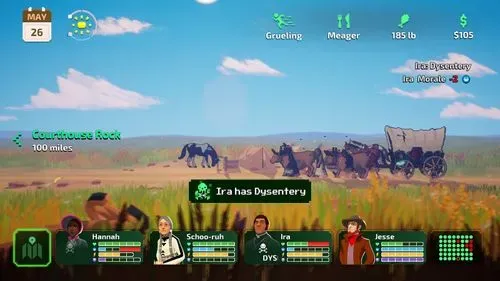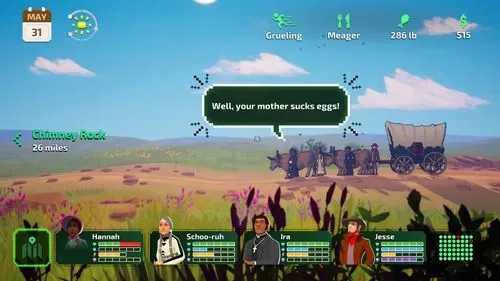PC
Switch
Dyin’ of dysentery like it’s 2005
If there was ever a game that most Americans could get nostalgic for, The Oregon Trail would be it. Originally developed in the 1970s as an education tool, the title was a staple of elementary school history classes for the better part of 30-odd years. For the bulk of bald eagle lovers born in the late 1900s, it was an enjoyable break from the banality of prepubescent learning that still managed to teach them (and me, for that matter) about the horrors and humours of 1800’s America. However, now that most of those people have long since gone through puberty and are contending with their own horrific events, it’s strange to see it get remade by way of an iPhone game ported to mainstream platforms, and it’s even weirder to see how generally mediocre it is.
Mediocre is the key word in that last sentence, because this iteration of one of the classic survival games isn’t especially good or bad, but instead just kind of exists. Much like its namesake, the gist of The Oregon Trail involves getting a party of late 1800’s frontierspeople from the midwestern United States to, you guessed it, Oregon. To do that, you need to plan out a route along a handful of linear maps, ensure your group’s health/stamina/hygiene doesn’t drop too low, and occasionally engage in minigames to acquire food while solving rudimentary puzzles. You also need to barter with the locals to acquire supplies, complete a handful of straightforward quests, and in a more general sense, do everything that usually needs to be done in a survival game.

The catch, however, is that there is no real catch. The Oregon Trail is about as simple of a survival game as can be, with the bulk of your tasks being easy to complete but passively difficult to master. It’s possible to screw some of them up, and if you do you’ll face serious consequences, but the majority of the title involves little more than clicking on a location, waiting a few minutes for your party to travel there and then acquiring some sort of resource before you repeat the process ad nauseum. And while this isn’t necessarily a bad thing, it does mean the title isn’t especially engaging.
While on mobile platforms this is all well and good, on mainstream platforms The Oregon Trail struggles to keep you glued to your screen. There is always something to do, whether that’s collecting various animals to unlock journal entries or reorganising your caravan, very few of the title’s objectives are truly interesting or unique. The original title got away with this because it was little more than an interactive educational tool, but given that The Oregon Trail 2022 is a $30/£25 game on PC and Nintendo platforms, it’s hard for it to skimp by without any real sustenance in the modern age.
To put that another way, even though the story of your party’s quest to reach Oregon is somewhat interesting, especially because there’s plenty of historical accuracy on display, The Oregon Trail simply lacks the modern elements of its contemporaries. It doesn’t have the nail-biting moments of This War of Mine, the absurd story of Not Tonight 2 or the depressing overtones of Metro Exodus. This means that, while on a moment-to-moment basis, the title is fun enough, there isn’t a whole lot to keep you engaged once you get bored of wandering the American West with a weakened group of once-warriors.
Admittedly, if you do enjoy The Oregon Trail’s simplistic gameplay, there is a lot of it here. You can play through a plethora of additional stories in addition to the main plotline, including ones that impose additional challenges or offer you new characters to play around with. These things don’t change the core of the game, but they’re nice additions that help justify its exorbitant price tag if you’re looking for what equates to an almost code-for-code rehash of the original Oregon Trail.

However, ultimately, the problem with The Oregon Trail 2022 is that regardless of how much content it has, the title is just as similarly banal as its namesake. While its forebear was a staple of primary school computer labs for years, this version of the game offers very little while demanding a lot from your wallet. It has decent enough gameplay, solid visuals, plenty of stuff to do and is historically accurate (as well as addressing some of the more problematic elements of Native American culture), but these things don’t change the fact that its framework was designed when the internet was an unknown technology. Anyone who’s looking for a fun but forgettable title could certainly choose worse ways to spend their money, but those who want a modern survival game would be better served by buying something from Steam’s Early Access section.
You can subscribe to Jump Chat Roll on your favourite podcast players including:
Let us know in the comments if you enjoyed this podcast, and if there are any topics you'd like to hear us tackle in future episodes!



